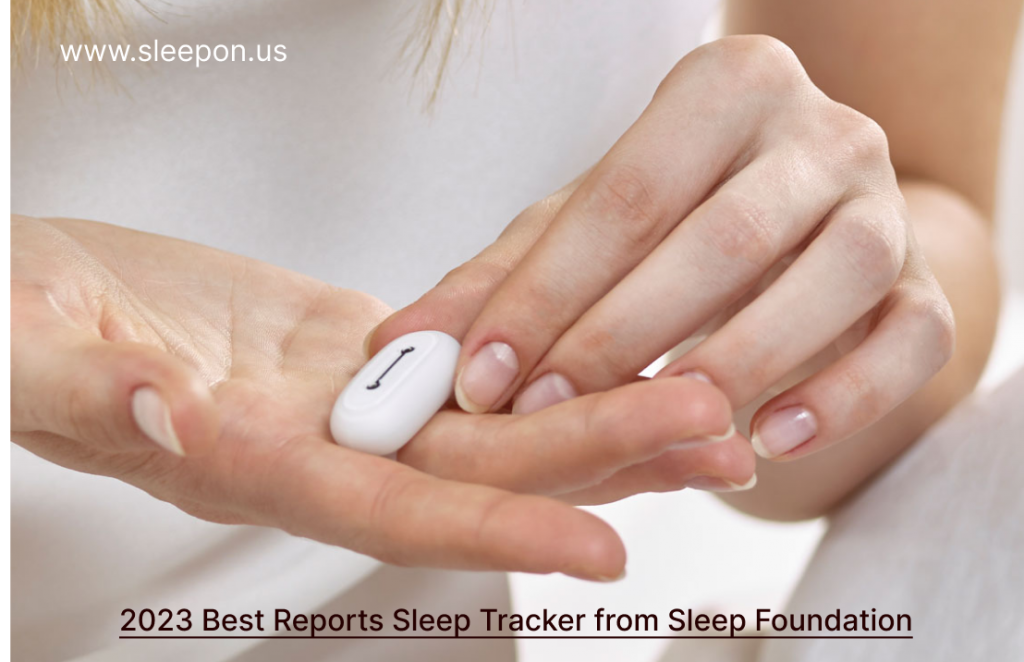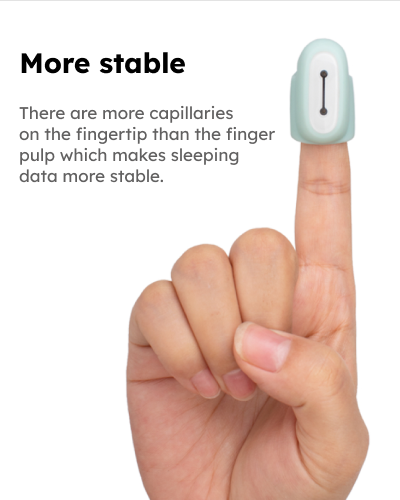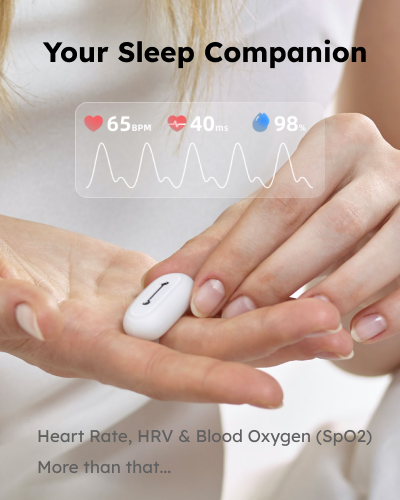
Heart Rate – Revitalized Because of You
Heart Rate
Heart Rate, the frequency of heartbeats, is typically expressed as beats per minute (bpm). Under normal circumstances, the resting heart rate for adults ranges from 60 to 100 bpm.
Understanding and monitoring heart rate contribute to assessing an individual’s physiological adaptability, cardiovascular health, sleep quality, and detecting potential sleep issues.
It aids in evaluating stress adaptation, overall health, and assists in detecting potential heart or other health problems. By comprehending heart rate, individuals can better manage their lifestyles, exercise plans, and enhance their quality of life.
Potential Health Issues Indicated by Different Heart Rate Patterns
1. Arrhythmia:
– Irregular heart rate patterns may be indicative of arrhythmia, such as atrial fibrillation or other cardiac rhythm abnormalities. This condition may increase the risk of stroke and heart disease.2. Tachycardia:
– Persistent high heart rates may suggest an overactive sympathetic nervous system or may be due to cardiac issues, anxiety, or thyroid problems.3. Bradycardia:
– A slow heart rate may be associated with issues in the cardiac conduction system, heart disease, or certain medication side effects.4. Nocturnal Heart Palpitations:
– Nighttime palpitations could be related to sleep apnea, anxiety, or heart disease, potentially leading to a decrease in sleep quality.5. Sleep Apnea:
– Sudden spikes in heart rate may be linked to sleep apnea, where breathing pauses lead to a drop in oxygen levels, forcing the heart to work harder.6. Stress and Anxiety:
– Prolonged elevation of heart rate may be a result of emotional stress or anxiety, affecting sleep quality and overall health.7. Low Oxygen Saturation (Hypoxia):
– Low oxygen levels may cause the heart to work harder to compensate for the body’s oxygen needs. This could be related to issues in the lungs or respiratory system.8. Overtraining:
– Prolonged, high-intensity exercise may lead to overtraining, causing an increase in heart rate and potentially impacting the cardiovascular system. These heart rate abnormalities may signal potential health issues. Therefore, for any abnormal heart rate patterns or concerns related to cardiac health, it is advisable to promptly consult with a healthcare professional for appropriate assessment and guidance.
Different Heart Rate Variations Across Sleep Stages
The human body experiences variations in heart rate during different sleep stages, which include wakefulness, Non-Rapid Eye Movement (NREM), and Rapid Eye Movement (REM). Here is a general pattern of heart rate changes during different sleep stages:1. Wakefulness:
– During wakefulness, the heart rate is typically higher, influenced by external stimuli and physical activity. This is because the body requires more oxygen and energy to sustain various physiological functions while awake.2. Non-Rapid Eye Movement (NREM):
– NREM is divided into three stages: N1, N2, and N3. During NREM sleep, the heart rate gradually decreases. – N1 Stage: Light sleep, heart rate starts to decline but remains relatively steady. – N2 Stage: Light to moderate sleep, both heart rate and respiration gradually slow down. – N3 Stage: Deep sleep, lowest heart rate, muscle relaxation, and physiological repair and recovery occur.3. Rapid Eye Movement (REM):
– During REM sleep, heart rate and respiration become more irregular. While muscles relax similarly to deep sleep, brain activity and heart rate increase. Dreams typically occur during the REM stage.4. Changes Throughout the Night:
The sleep cycle in humans roughly occurs every 90 to 110 minutes, comprising both NREM and REM stages. Throughout the night, the heart rate fluctuates during these cycles, undergoing multiple transitions between NREM and REM. In summary, the cyclic nature of sleep means that the heart rate will rise and fall several times throughout the night. While these variations are normal, abnormal heart rate patterns may be associated with sleep disorders or other health issues. Monitoring and analyzing heart rate data during sleep can provide a better understanding of an individual’s sleep quality and may prompt seeking professional medical advice when necessary.Comments (31)
Leave a Reply Cancel reply
Recent Posts
ALL ARTICLES
Subscribe Us
Receive updates on sleep tips & tricks, exclusive offers and more exciting!
Better sleep, better life.
403A, Building A2, Zhihui Park, Fuyong Street, Bao'an District, Shenzhen, Guangdong, China
Products
Company
Copyright © SLEEPON. All rights reserved.
SLEEPON keeps both Sleeponhealth and Sleepon.us due to the brand upgrading. We promise to provide the same products and service in both sites.











you are truly a just right webmaster The site loading speed is incredible It kind of feels that youre doing any distinctive trick In addition The contents are masterwork you have done a great activity in this matter
Mandatory read, much appreciated.
you are truly a just right webmaster The site loading speed is incredible It kind of feels that youre doing any distinctive trick In addition The contents are masterwork you have done a great activity in this matter
Its like you read my mind You appear to know so much about this like you wrote the book in it or something I think that you can do with a few pics to drive the message home a little bit but other than that this is fantastic blog A great read Ill certainly be back
You’re so awesome! I don’t believe I have read a single thing like that before. So great to find someone with some original thoughts on this topic. Really.. thank you for starting this up. This website is something that is needed on the internet, someone with a little originality!
Excellent information was provided. I truly liked reading this piece, and I’m grateful to the author for providing it. Thank you for sharing this blog post. Once again, thanks. Nice.
very informative articles or reviews at this time.
Thank you, I have just been searching for information approximately this topic for a while and yours is the best I have found out so far. However, what in regards to the bottom line? Are you certain concerning the supply?
I do trust all the ideas you’ve presented in your post. They are really convincing and will definitely work. Nonetheless, the posts are too short for newbies. May just you please lengthen them a bit from next time? Thank you for the post.
certainly like your website but you need to take a look at the spelling on quite a few of your posts. Many of them are rife with spelling problems and I find it very troublesome to inform the reality nevertheless I will definitely come back again.
I do not even know how I ended up here, but I thought this post was great. I don’t know who you are but definitely you’re going to a famous blogger if you aren’t already 😉 Cheers!
I do not even know how I ended up here, but I thought this post was great. I don’t know who you are but definitely you’re going to a famous blogger if you aren’t already 😉 Cheers!
Magnificent beat ! I would like to apprentice while you amend your site, how can i subscribe for a blog web site? The account helped me a acceptable deal. I had been a little bit acquainted of this your broadcast offered bright clear idea
What i don’t understood is in reality how you’re now not really a lot more smartly-favored than you might be now. You’re very intelligent. You understand therefore significantly in terms of this topic, produced me personally believe it from a lot of numerous angles. Its like women and men are not interested except it is one thing to accomplish with Woman gaga! Your own stuffs outstanding. Always care for it up!
Fantastic beat ! I would like to apprentice while you amend your web site, how could i subscribe for a blog site? The account helped me a acceptable deal. I had been a little bit acquainted of this your broadcast offered bright clear concept
I have read some excellent stuff here. Definitely value bookmarking for revisiting. I wonder how much effort you put to make the sort of excellent informative website.
Thank you for the auspicious writeup. It in fact was a amusement account it. Look advanced to more added agreeable from you! By the way, how could we communicate?
Hi, i think that i saw you visited my web site thus i came to ?eturn the favor텶 am attempting to find things to improve my web site!I suppose its ok to use some of your ideas!!
Somebody essentially lend a hand to make significantly posts I might state. That is the very first time I frequented your web page and up to now? I surprised with the research you made to create this particular put up amazing. Excellent job!
certainly like your website but you need to take a look at the spelling on quite a few of your posts Many of them are rife with spelling problems and I find it very troublesome to inform the reality nevertheless I will definitely come back again
Thank you for the auspicious writeup. It in fact was a amusement account it. Look advanced to far added agreeable from you! However, how can we communicate?
Thank you for the good writeup It in fact was a amusement account it Look advanced to far added agreeable from you However how could we communicate
I was suggested this web site by my cousin Im not sure whether this post is written by him as no one else know such detailed about my trouble You are incredible Thanks
Somebody essentially lend a hand to make significantly articles I’d state. That is the very first time I frequented your website page and up to now? I surprised with the research you made to make this actual submit amazing. Wonderful task!
Usually I do not read article on blogs, however I would like to say that this write-up very compelled me to take a look at and do so! Your writing taste has been amazed me. Thanks, quite nice post.
Thank you for the auspicious writeup It in fact was a amusement account it Look advanced to more added agreeable from you By the way how could we communicate
I truly appreciate your technique of writing a blog. I added it to my bookmark site list and will
Elitepipe Plastic Factory’s commitment to customer satisfaction is evident in their prompt delivery schedules and exceptional after-sales service. Elitepipe Plastic Factory
Good post! We will be linking to this particularly great post on our site. Keep up the great writing
I’m often to blogging and i really appreciate your content. The article has actually peaks my interest. I’m going to bookmark your web site and maintain checking for brand spanking new information.
This is my first time pay a quick visit at here and i am really happy to read everthing at one place